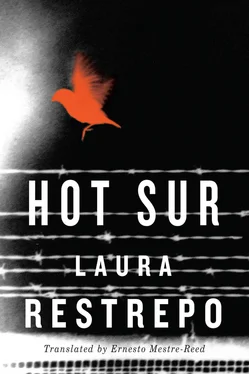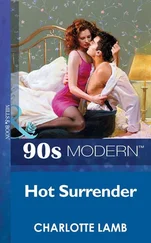“Can you describe her?” I ask Rose. “Violeta. What was she like that first time you saw her?”
“María Paz had told me about her long hair that fell almost to her waist. But that was gone. Her hair was the opposite, in fact, defiantly short, almost buzzed, at the most half an inch long, like a private in the army. It actually didn’t look bad on her. On the contrary, it helped call attention to the perfection of her features, especially her eyes. Huge eyes, intensely green, like a big cat’s, or in any case not very human. Humongous and green but shallow. I’m not sure how to describe it. Her whole face had a flat overall expression, as if there were some final connection missing. An expression that had no resonance. That’s it. No feedback, no echo. I couldn’t tell you anything about her nose or her mouth, because I’m not sure I even noticed them, lost as I was in her eyes. She was definitely tall and slender, and not dark-skinned like María Paz, but fair. By just glancing at them, you would never guess they were sisters. It’s only after interacting with them for a while that you begin to grasp a resemblance. If you want, I can tell you more about her eyes, because I focused almost entirely on them. The whites were clean, pure, liquid, and the irises were made of concentric circles of revolving lemon green and green gold, a pair of psychedelic, painfully expressionless buttons and yet very beautiful, like those of an antique doll. I’d say she’s a girl of disturbing beauty, but also a bit disturbed herself. Also very sensual, yes. I noticed that even though at first I could only look into her averted eyes. A lustful virgin, perhaps, or rather a young fairy, a somewhat mischievous one. And something told me that this was a lost child for the world, but more lucid and intelligent than other mortals.”
Rose kept his distance from the sisters when they first saw each other again. It seemed too intimate and too emotional to intrude. It was clear that at that moment María Paz was putting it all on the line, double or nothing, that she was making a definitive decision even as she took part in the exchange that Rose observed from a discreet distance, the figures blurred by the viscosity of the cold air. He tells me that there were no hugs or any other physical contact. Violeta would not look directly even at her own sister, and María Paz seemed wary of not slipping up and getting too close, even when she pulled a blanket out of the car because Violeta was so underdressed for the cold. She tried to hand her sister the blanket, Rose says, but Violeta didn’t take it. Instead, she pulled down the sleeves of her sweater, stretching them to cover her hands, which must have been freezing. María Paz cried. That part of it Rose was able to figure out later. Violeta seemed hypnotized by the dogs; all her attention was focused on the three animals. Then María Paz gave her a bag with some gifts, quite wrongheaded it turned out, because the gifts were a few sets of barrettes for her hair, the kind you can get at any drugstore. But what hair? Violeta put them back in the bag after she looked at them and handed them back to her sister.
“Look, Violeta, this is Mr. Rose,” María Paz said, gesturing for Rose to come closer. “He is a very dear friend who’s going to help us with everything. Say hello, tell him your name.”
“He’s your boyfriend,” Violeta said.
“No, he’s not my boyfriend, not at all. He’s a good friend but he’s not going to live with us; no worries, Violeta. He’s not my boyfriend.”
“Your old boyfriend. Like Greg, old.”
“No, Violeta,” Rose said, “I can assure you. I’m leaving in a little while, and you will stay with your sister, just the two of you.”
Violeta finally seemed to understand the situation, and she let out a little speech that seemed memorized, addressing Rose, but still not looking at him.
“I’m autistic,” she said. “Sometimes I seem rude, but only because I’m autistic. I don’t kick or spit on people. I just have autism. Autism. At school, they are teaching me to manage my disease. To laugh when I’m touched. They also teach us music and math. Music and mathematics.”
“Go get your things and come back,” María Paz said. The moment had come.
“Go get your things and come back,” Violeta repeated.
“Just pack a small suitcase, very small, but you have to be quick.”
“Have to be quick.”
“Go, love, don’t you see? I’m taking you with me. Just like I promised. Together! Just us, without Greg, without this man, no one. You and me, no one else: Big Sis and Little Sis. Then we’ll no longer be alone. Do you understand me, Violeta?”
“I can’t fit my stuff in a tiny suitcase.”
“Bring only what you like the most. I brought clothes for you. New clothes, you’ll see. It’ll be great.”
“I don’t think the new clothes will fit me very well.”
“Come on, Violeta, we don’t have time for this. Bring your things. I’ll wait here.”
“It was all very strange,” Rose tells me. “A difficult moment, surreal, very tense, and there I was, right in the middle of it.”
Violeta was gone for roughly fifteen minutes. When she returned, it was without a bag or suitcase, just a stuffed animal. A giraffe. María Paz later told Rose that it was the same giraffe Violeta had brought on the plane to America when their mother had sent for them.
“Good job, Little Sis!” María Paz congratulated her. “You brought your giraffe! Now hop in, we’re going on a trip with the dogs.”
“With the dogs,” Violeta repeated, but she did not move.
“Come on, Little Sis,” an anxious María Paz said. “Come, we’ll be together from now on. I promise. Always together.”
“Always together.”
“Didn’t you miss me all this time?”
“All this time.”
“Listen to me, Violeta, I beg you.”
“Listen to me, Violeta, I beg you.”
“I came all the way here for you, Violeta! Come, get in the car so we can go.”
“Big Sis goes,” said the girl. “Little Sis stays.”
“Don’t you want to go to Seville?”
“Go to Seville?
“We’ll go together, my sweet, together forever. Isn’t that what you want?”
“Big Sis is going to Seville. Big Sis is going to Seville. Little Sis stays here. Little Sis is fine here,” she said with a tremulous, metallic voice that sounded like the clatter of a typewriter. Then she handed the giraffe to her sister, ran toward the school, and disappeared through the door, without even looking back.
“I had never seen María Paz as defeated as she was that day,” Rose informs me. “It was as if someone had taken a sledgehammer to her head, as if all the lights had been shut off. I tried to comfort her, saying that the next day was Sunday, also a visiting day, and we could try again. But she said there was no point, that Violeta was the most stubborn creature on the face of the earth. Once she got something into her head, no one could get it out of there. She had made her decision and there was no turning back, María Paz insisted, and I knew she was right. Then I tried to tell her what I had been thinking all along, what to me was more than obvious. I talked honestly with María Paz and told her that I thought Violeta was right. It would without a doubt be better for her there, at that school, an appropriate place for her, where she was clearly nurtured and protected and made to feel good about herself. Much better than scampering around the world with a fugitive sister whose fate was as unpredictable as the winds. I asked her if the pension that paid for the school was secure, because it had to be expensive as hell, and she said it was, that Socorro was in charge of that. Socorro had promised their mother that she would serve as executor of the trust and so far had remained true to her word. I promised María Paz that if at some point Socorro could no longer perform her duties, I would take over. Pro Bono could help me set this up. I’d make payments to the school on time every month, so María Paz shouldn’t worry. I insisted on how much good such an institution did for her sister: it protected her from the constant change that so negatively affects people with her condition, and built confidence with good routines, free from the anxiety and loss of control brought about by new and unforeseen events.”
Читать дальше












